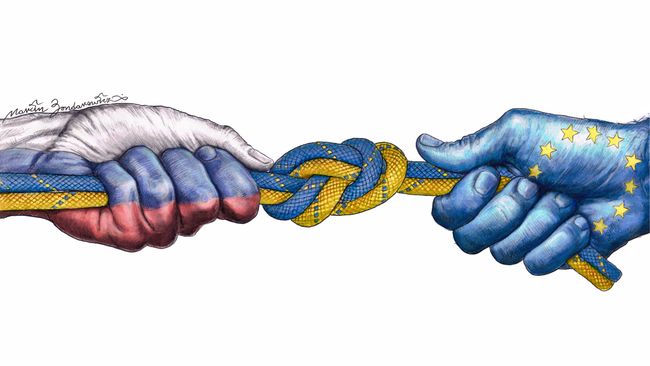“Escalation” of peacemaking
Expert: “The fact that Nuland is flying to Kyiv means that there are no negotiations behind Ukraine’s back”
The US State Department has announced that Victoria Nuland, Assistant Secretary of State for European and Eurasian Affairs, will travel to Kyiv on June 21 to discuss some bilateral and regional issues, such as reform priorities and implementation of the Minsk Agreements, with top Ukrainian officials, including Foreign Minister Pavlo Klimkin and Deputy Head of the Presidential Administration of Ukraine Kostiantyn Yelisieiev.
After this, Nuland is to visit Moscow, where she will discuss the situation in eastern Ukraine and further steps to carry out the Minsk Agreements and support the efforts of the Normandy Four and the Trilateral Contact Group. Putin’s spokesman has already said that the Russian president does not plan to receive the US Assistant Secretary of State. Instead, Nuland will meet the president’s aide Vladislav Surkov. It will be recalled that Nuland visited Kyiv last spring, Kaliningrad last January, and Moscow in May. She said in the course of those visits that it is necessary to hold elections in the occupied Donbas in the autumn.
The Ambassador-designate of the US to Ukraine, Marie Yovanovitch, said at a recent appointment testimony that she was astonished by the progress Ukraine had achieved in carrying out reforms over the past two years. “Ukraine has lived up to many Minsk commitments already. But Russia and the separatists have not. Violence has spiked in the past two months to reach levels we have not seen since August 2015. Russia and the separatists must end their attacks – they continue to commit the majority of ceasefire violations – and withdraw banned heavy weapons, while providing the OSCE full, unfettered access throughout the conflict zone and guaranteeing monitors’ safety,” she said among other things.
COMMENTARY
Serhii SOLODKY, first deputy director, Institute of World Politics:
“The information about voting for the bill on elections on the occupied territories and the visit of Nuland are interconnected. Obviously, various formats of elections are under discussion now because the political part of the Minsk process has been on the agenda of the dialog between Ukraine and our Western partners for quite a long time. As is known, Ms. Nuland focused on this topic in her negotiations with the Russians, particularly with Vladislav Surkov.
“It is good that Nuland is flying to Kyiv – this means that there are no negotiations behind Ukraine’s back. As far as I know, the Americans submit reports to the Ukrainian government before, during, and after this kind of talks. I would not say that our partners do not take into account the position of our state. And the fact that Surkov visits the Donbas and Russia is holding negotiation only stresses again what the Russians are denying – Russia, not Donetsk or Luhansk, is a party to the negotiations in this conflict.
“As for Ukraine’s official position, which I fully share, I will say it would be unwise to switch to the election stage before security problems have been resolved. With all due respect for Nuland, Steinmeier, and Ayrault, I must say that the truth is on Ukraine’s side. Fire exchange is still going on, OSCE observers are not allowed to the Ukraine-Russia border across which Russia continues to supply weapons and personnel on a mass scale. OSCE observers are allowed to visit militants’ weapon depots in a very limited measure.
“I do not oppose discussing the idea of elections or of anything else at the level of theory. But when it comes to holding an election, there must be a clear algorithm: first security and then the expression of popular will. Besides, there should be an unambiguous condition: people involved in bloodshed have no right to take part in the elections. Besides, it may happen that security will be ostensibly ensured, fire will be ceased, a law will be passed, and preparations for the elections will begin, but instability will return at a certain stage. This situation requires some safety measures. On the whole, if a law on elections on the now occupied territories is to be passed, the elections should not be linked to concrete dates because Russia may create a semblance of security in the region and then bring its puppets to power, establish its own kind of ‘decentralization,’ and influence the events in Ukraine. Or what is to be done if no truce is arranged, the OSCE Special Monitoring Mission, Ukrainian parties and media are kept aside, but everything will be tied up to the election date? Maybe, it will be a good idea to draw up a clause that ‘the elections shall be held within 90 days after the OSCE reports on compliance with the stipulated conditions.’
“The election issue is being whipped up because the West is interested in settling this conflict as soon as possible, for it has a lot of its own internal and security-related problems, such as terrorism, refugees, ‘Brexit,’ Trump, etc. The West would like to get rid of at least one problem on the agenda as well as to ease sanctions because this subject is being taken advantage of by all kinds of radical movements – both left and right. Yet one must remember instances in history, when haste in fulfilling the plans of settlement and elections resulted in a renewed conflict. Besides, the talk about lifting sanctions and holding elections on the occupied territories is a sign of the West’s weakness, which prompts Russia to continue its aggressive policy. The Minsk process shows no decisive changes or noticeable progress. Therefore, there are no grounds for optimism on the part of our Western partners. Accordingly, there are no grounds for sanctions to be eased and for a new stage – a political settlement of the situation.”






